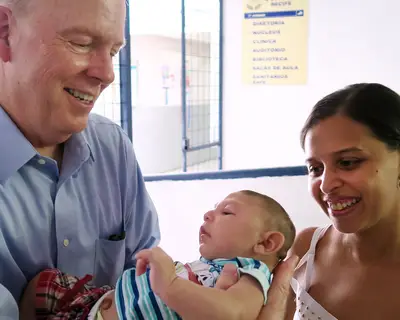RESEARCH TRIANGLE PARK, NC— The impact of congenital Zika syndrome on families will be substantial and will last a lifetime, given its severity and uncertainty about long-term outcomes for infants.
What do we know and what can we expect regarding the cognitive, behavioral, and functional development of children with congenital Zika syndrome? How can families best be supported? Why might some babies develop better than others?
A new supplement, published today in Pediatrics, co-edited by researchers at RTI International and Brazil’s Altino Ventura Foundation, helps answer these questions and more by bringing together new evidence about prevention, lessons learned, and suggestions for a path forward concerning the Zika virus.
“Families who have a child with congenital Zika syndrome face an immediate set of demands for specialized caregiving and other factors, such as societal stigma, limited professional knowledge about congenital Zika syndrome, and uncertain future outcomes for their child,” said the supplement’s co-editor Don Bailey, Ph.D., Distinguished Fellow and director of RTI’s Center for Newborn Screening, Ethics, and Disability Studies. “Since Zika is a relatively new public health concern, there is a lack of specialized knowledge on the life expectancy of these infants and the long-term health problems they will experience.”
Congenital Zika syndrome refers to the pattern of birth defects among fetuses and infants of mothers infected with Zika virus during pregnancy. The effects of Zika virus can be severe and include microcephaly where the skull has partially collapsed, decreased brain tissue, joints with limited range of motion, nervous system damage, and other health issues. Microcephaly has been linked with developmental delay, seizures, intellectual disability, feeding problems, and hearing and vision loss.
Zika was declared a public health emergency in 2016 by the World Health Organization. The Centers for Disease Control and Prevention reported that about one in 10 pregnant women with a confirmed Zika infection during pregnancy had a baby with Zika-related complications in 2016.
“It’s safe to say that most children with congenital Zika syndrome will have major impairments that will not be easily treated by surgery, medication or therapy services,” Bailey said. “This supplement synthesizes available information for pediatricians to inform their clinical practice, and will help guide the research agenda and shape public policy for addressing the impact of Zika going forward.”
The supplement includes six articles, three of which are authored by RTI researchers. The research explores what is known and unknown about the effects of the virus, including developmental profiles of infants with congenital Zika syndrome and suggested public health approaches to address the needs of these children.
Researchers suggest four practice areas to support families who have a child with congenital Zika syndrome:
- Provide accurate and understandable information about congenital Zika syndrome
- Use active surveillance to identify emerging needs
- Enable access to formal support services and informal support systems
- Provide both general and targeted interventions as needed to support child health, development and positive family adaption
RTI and the Altino Ventura Foundation are currently examining the health and development outcomes of infants most severely affected by the Zika virus in Recife, Brazil. Funded by the Eunice Kennedy Shriver National Institute of Child Health and Human Development, researchers are following 200 infants with congenital Zika syndrome and their families to understand the ongoing health impact, why some babies affected by the virus develop more normally than others, and if more positive prognoses are linked with family or environmental characteristics.
RTI researchers have been at the forefront of Zika virus research to help communities worldwide understand and stop the spread of infection. To learn more, visit RTI’s Zika research webpage.

- The impact of congenital Zika syndrome on families will be substantial and will last a lifetime, given its severity and uncertainty about long-term outcomes for infants
- A new supplement, published today in Pediatrics, co-edited by researchers at RTI International and Brazil’s Altino Ventura Foundation, brings together new evidence about prevention, lessons learned, and suggestions for a path forward concerning the Zika virus
- The research explores what is known and unknown about the effects of the virus, including developmental profiles of infants with congenital Zika syndrome and suggested public health approaches to address the needs of these children
RTI International Media Relations:
As an independent, scientific research institute with a mission to improve the human condition, RTI International is engaged by clients and partners to conduct evidence-based research and project implementation. We share our work in line with journalistic and scientific standards and maintain a record in RTI’s Newsroom.
RTI International is an independent scientific research institute dedicated to improving the human condition. Our vision is to address the world's most critical problems with technical and science-based solutions in pursuit of a better future. Clients rely on us to answer questions that demand an objective and multidisciplinary approach—one that integrates expertise across social, statistical, data, and laboratory sciences, engineering, and other technical disciplines to solve the world’s most challenging problems.
For more information, visit www.rti.org.
